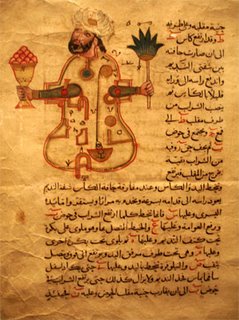 Yesterday, I have visited the "The Golden Age of Arabic Sciences" exhibition at the Arabic World Institute in Paris. Among a very good selection of many scientific discoveries of this civilisation, it was an opportunity to see some documents written by Al-Jazari. Ibn Ismail Ibn al-Razzaz Al-Jazari (1206 AD) was one of history's greatest engineers. He invented many automata and some of the first mechanical clocks, driven by water and weights. He was called Al-Jazari after the area where he was born, Al-Jazira, which is the traditional Arabic name for northern Mesopotamia. Al-Jazari draws on the works of its predecessors both from the Greeks (Philon, Heron and Archimede) and Islamic world (Banu Musa brothers, Al-Khuwarizmi and Ridwan). His contribution was very important for the diffusion of knowledge in the Arabic world and after in Europe due to the translations of his books like "The Book of Knowledge of Ingenious Mechanical Devices" which contains more than 150 automata and mechanical devices. I take the picture in the museum showing a page of "A Compendium on the Theory and Practice of the Mechanical Arts" dated 1315-1316 (AD). The picture shows the internal structure of an automata for serving and arbitrating drinking sessions. That is to say that Al-jazira has an important place in the history of artificial creatures.
Yesterday, I have visited the "The Golden Age of Arabic Sciences" exhibition at the Arabic World Institute in Paris. Among a very good selection of many scientific discoveries of this civilisation, it was an opportunity to see some documents written by Al-Jazari. Ibn Ismail Ibn al-Razzaz Al-Jazari (1206 AD) was one of history's greatest engineers. He invented many automata and some of the first mechanical clocks, driven by water and weights. He was called Al-Jazari after the area where he was born, Al-Jazira, which is the traditional Arabic name for northern Mesopotamia. Al-Jazari draws on the works of its predecessors both from the Greeks (Philon, Heron and Archimede) and Islamic world (Banu Musa brothers, Al-Khuwarizmi and Ridwan). His contribution was very important for the diffusion of knowledge in the Arabic world and after in Europe due to the translations of his books like "The Book of Knowledge of Ingenious Mechanical Devices" which contains more than 150 automata and mechanical devices. I take the picture in the museum showing a page of "A Compendium on the Theory and Practice of the Mechanical Arts" dated 1315-1316 (AD). The picture shows the internal structure of an automata for serving and arbitrating drinking sessions. That is to say that Al-jazira has an important place in the history of artificial creatures.Monday, March 13, 2006
Al-Jazari Automata
 Yesterday, I have visited the "The Golden Age of Arabic Sciences" exhibition at the Arabic World Institute in Paris. Among a very good selection of many scientific discoveries of this civilisation, it was an opportunity to see some documents written by Al-Jazari. Ibn Ismail Ibn al-Razzaz Al-Jazari (1206 AD) was one of history's greatest engineers. He invented many automata and some of the first mechanical clocks, driven by water and weights. He was called Al-Jazari after the area where he was born, Al-Jazira, which is the traditional Arabic name for northern Mesopotamia. Al-Jazari draws on the works of its predecessors both from the Greeks (Philon, Heron and Archimede) and Islamic world (Banu Musa brothers, Al-Khuwarizmi and Ridwan). His contribution was very important for the diffusion of knowledge in the Arabic world and after in Europe due to the translations of his books like "The Book of Knowledge of Ingenious Mechanical Devices" which contains more than 150 automata and mechanical devices. I take the picture in the museum showing a page of "A Compendium on the Theory and Practice of the Mechanical Arts" dated 1315-1316 (AD). The picture shows the internal structure of an automata for serving and arbitrating drinking sessions. That is to say that Al-jazira has an important place in the history of artificial creatures.
Yesterday, I have visited the "The Golden Age of Arabic Sciences" exhibition at the Arabic World Institute in Paris. Among a very good selection of many scientific discoveries of this civilisation, it was an opportunity to see some documents written by Al-Jazari. Ibn Ismail Ibn al-Razzaz Al-Jazari (1206 AD) was one of history's greatest engineers. He invented many automata and some of the first mechanical clocks, driven by water and weights. He was called Al-Jazari after the area where he was born, Al-Jazira, which is the traditional Arabic name for northern Mesopotamia. Al-Jazari draws on the works of its predecessors both from the Greeks (Philon, Heron and Archimede) and Islamic world (Banu Musa brothers, Al-Khuwarizmi and Ridwan). His contribution was very important for the diffusion of knowledge in the Arabic world and after in Europe due to the translations of his books like "The Book of Knowledge of Ingenious Mechanical Devices" which contains more than 150 automata and mechanical devices. I take the picture in the museum showing a page of "A Compendium on the Theory and Practice of the Mechanical Arts" dated 1315-1316 (AD). The picture shows the internal structure of an automata for serving and arbitrating drinking sessions. That is to say that Al-jazira has an important place in the history of artificial creatures.
Subscribe to:
Post Comments (Atom)
No comments:
Post a Comment